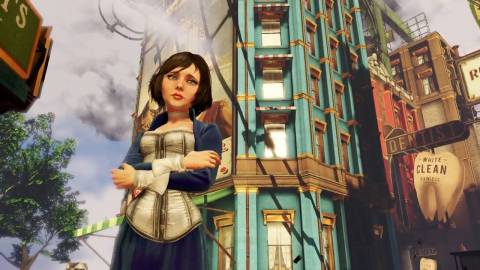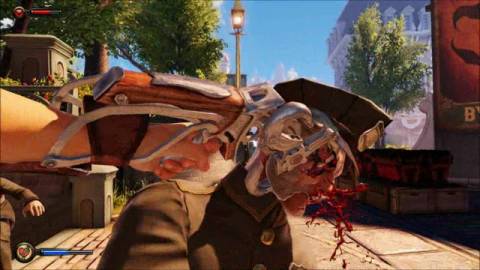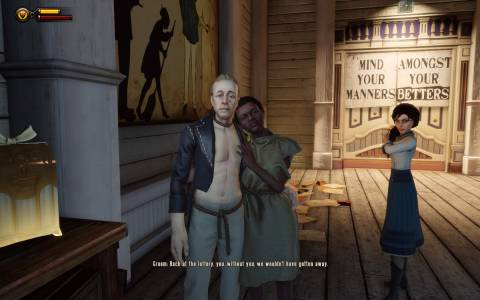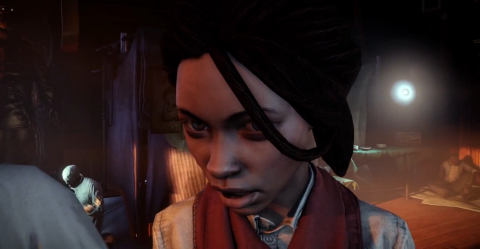I feel like I've just spent the entirety of the past week talking about BioShock Infinite. This is odd, because in truth, I've only spoken to one actual person about BioShock Infinite at any length, and it wasn't even for all that long. In reality, I've mostly just been listening to everyone else talk about BioShock Infinite, which many have been doing with increasing frequency and word count.

The timing makes sense. We're a couple of weeks past the game's release, meaning that even the majority of early adopting dawdlers have finally gotten around to seeing the game's conclusion, and probably taken at least a few days to recollect and break down the details of their journey through Columbia. For that first week after release, all I heard from anyone was simple reverie over having seen the game's many twists and turns through to conclusion. This week, that reverie turned to deep, thoughtful criticism of Infinite's many themes, systems, successes, and failures.
To some of you, that last one might have seemed like the dominating factor in people's discussions. As with all immediately beloved things, backlash was inevitable. And I don't necessarily mean that in the knee-jerk sense of the word, but more in the sense of critics pushing back on the notion that Infinite is somehow infallible or flawless. I doubt anyone would actually claim such a thing, but seeing that sudden uptick in more negative--or, at the very least, pointed--critiques has galvanized people on both sides of the fence. Thus, this week has been a difficult one to weather if you haven't actually finished BioShock Infinite, because dammit if it isn't the only thing anyone's really felt like discussing, apparently.
Out of all the discussions and essays I've read this week--I think I stopped counting at around 20 individual pieces--a few specific, key criticisms have risen above the fray and seemingly become the focus of the larger conversation. If you'll indulge me, I thought it might be fun to look at the different sides of those points here, and highlight the most interesting takes.
That said, know that to go any further into this column is to accept that spoilers will be coming. If you have not finished BioShock Infinite and intend to do so, turn back immediately.
Do No Harm?
No one subject in BioShock has divided people more fiercely than that of its combat and related violence. There's no getting around the fact that Infinite is absolutely gruesome at times. Gun combat alone can lead to buckets of blood painting every wall and floor in your nearby area, but once you start picking up on the particularly grotesque melee attacks, that's when the game maybe crosses a line.
This has been written about furiously on both sides of the equation, though most of the most passionate pieces lean on the notion that the violence is particularly harmful to the game. Some, like Kotaku's Kirk Hamilton, have called it out for the sheer unpleasantness and pervasiveness of its gore. Polygon's Chris Plante made a similar point in his own piece on the game, referencing his own wife's aversion to Infinite's obsession with viscera. Even former Epic honcho Cliff Bleszinski took umbrage with the ugly shift the game makes every time you enter combat.
I agree with those assessments, though I'll say that the problems I had with Infinite's combat sequences had less to do with the abundance of blood and more to do with the way combat is paced within the game. I actually liked Infinite's combat a great deal more than I did in BioShock. Once I got certain plasmids and upgrades in BioShock, I felt like I was pretty easily able to tear through most enemies, and the guns never really felt right. Infinite's combat worked much better for me. I felt like the guns and vigors were suitably powerful (if occasionally overpowered), the enemies were smart enough to challenge me, and that the the melee hits were much more satisfying, if utterly brutal.

And yet, every time a combat sequence would kick up during my play time, I groaned. Not because I didn't derive any enjoyment from the battles, but because they always seemed to come shrieking in out of nowhere. In this regard, I think my biggest issue is that the game doesn't have enough volume settings, tonally. There are maybe three distinct vibes in Infinite. Quiet exploration, slightly less quiet exploration/dialogue, and HOLY SHIT EVERYTHING IS SCREAMING BLOODY AND ON FIRE. It's super jarring, because most times you'll just be kind of walking around, looking for items and voxophones and whatever else, then you walk through a door or a hallway and suddenly the music swells, people start shouting at you, and it's balls-to-the-wall gunfire and vigoring until that screech of the musical strings comes along to let you know that it's about to be quiet time again.
However, I'm not of the mind that Infinite didn't need to be a shooter, as some have suggested. As Destructoid's Jim Sterling rightly notes in his own write-up on the subject, the violence in Infinite isn't without merit to the story. Booker DeWitt is a man of terrible violence. His self-torture over his role in the Wounded Knee massacre is completely, utterly the focal point of Infinite's story. To have him try to traipse his way through Columbia sans any bloodshed would not only perhaps be a bit dull, but also betray the nature of the character being presented. Booker kills people because that's just who Booker is, no matter which version of him we're talking about.
What I would say is not that Infinite didn't need violence to succeed, but that it needed a different brand of violence to succeed. The violence in Infinite can be effective, especially in more solitary moments, such as the individual confrontations Booker has with Comstock and Slade. But those are the more scripted moments of violence in the game, and without a script, Infinite becomes a blinding din of blood, screams, and explosions. If you go back and watch that E3 demo that won Infinite its embarrassment of awards, you'll note that the combat sequence it shows isn't remarkably different from what ended up in the final game, save for the demo version's apparent and obvious scripting in certain situations. In that demo sequence, Booker is able to deftly jump from skyline to skyline, easily interact with Elizabeth several times, blow up a fucking zeppelin, and kill dozens of guys in the process. It looks incredible, but nothing quite that deft ever made it into the final game. Instead, the vast majority of battles devolve into scads and scads of enemies loudly, breathlessly blasting at you while you try to simultaneously shoot back, find cover, and loot corpses over and over again.
A few of these particularly blistering battles I could have handled, but there's just too much of it in Infinite. So much, that it at times threatened to drown out the details I'd spent so much time accumulating while wandering around Columbia's endlessly fascinating world. By all means, give Booker some guns, some vigors, and let him fight the uglier elements of the city, but do so with pacing and tone in mind. It's more difficult to appreciate a game's quieter moments when you know that you're rarely more than a few moments away from wandering into a white-knuckle free-for-all.
As for the gore itself, yeah, I maybe could have done with fewer instances of people's faces being chewed off by a skyhook, though I'm also a massive horror fan, and stuff like this has long ceased to bother me. The gore of Infinite appears meant to appease my kind, which I appreciate. However, I think I'd also have been far more appeased if that gore were used for more than simple glorification of your character's brutality. If we're meant to look at Booker's particularly nasty fights and feel ashamed, the game doesn't do a good enough job of emphasizing the ugliness of it all without making it look celebratory. Limiting the available body count, and actually providing some consequences for Booker's killing outside of an occasional (mostly meaningless) admonishment from Elizabeth might have done the trick. Or it might not have. I don't know. All I do know is that what's there proved to be my least favorite part of Infinite.
In Defense of Window Dressing
Now here's an especially hot-button topic. There's a lot of chatter out there about how Infinite chooses to use its cultural setting. 1912 is a year in which American culture was absolutely still rooted in a deep and unpleasant view on other races and cultures. You see elements of that throughout Infinite, from simple displays that show you Comstock and the upper echelon of Columbia's distaste for minorities, to deeply troubling acts done against individual characters in the game. That said, there's also not a whole lot of this, and by the time Infinite hits its halfway point, the game seems to almost forget entirely about the plight of Columbia's minority population in favor of focusing on Booker, Elizabeth, and their struggle to figure out just what the hell is going on.

For some, this is apparently taken as a kind of betrayal on Irrational's part. The word "expectation" has been tossed around a lot in terms of how Infinite was theoretically supposed to tackle the larger racist issues of the time. In truth, Infinite is as much about racism as BioShock was about Objectivism. In both cases, the stories are built within worlds rooted within these themes, but the themes exist primarily to service the atmosphere of the individual story being told. Seeing the horrible racism of Columbia's Caucasian elite is jarring in much the same way seeing the aftermath of Andrew Ryan's doomed Atlas Shrugged party was in BioShock. But the core stories--Jack's tale in BioShock, and Booker's in Infinite--don't require the player to achieve a greater understanding of these things. We may think it abhorrent that we are asked to jovially throw a baseball at a tied-up multiracial couple in Infinite's early scenes, and some may find it equally abhorrent that the choice we make to or not to throw the ball boils down to little more than an opportunity to collect more loot later on. I would certainly agree that some of the elements of the city's racial makeup aren't necessarily treated with much care, but I also don't feel the game needed to go into them deeper in order for its story to work.
In seeing people calling out the game's handling of racism, I found myself recalling the nebulous way Ken Levine had talked about that aspect of the game during its promotional cycle. If you go back and read many of his interviews (including this one I did a couple of months before the game's release), you might notice that Levine often seems sort of taken aback that people continually asked him about the challenge of tackling such a hot-button issue. This makes me wonder if there was always something of a disconnect between Levine and the press' perception of what the game was at the time. Journalists repeatedly asked about the challenges of dealing with racist themes, and Levine often responded in a way that, now, makes perfect sense. We may have been talking about the racism as a larger part of the game, but to him, it was always simply a key cultural detail aimed at servicing his altogether crazier sci-fi story.
So yes, Infinite's racial themes ultimately boil down to little more than particularly heated window dressing, but I think there's a defense to be lobbied in favor of such window dressing. Once you see where Infinite's story is headed, it becomes much more about the core characters than it does the tone of Columbia's discourse. You're meant to understand who the people of Columbia are and what they're fighting for. That fight, ultimately, is ancillary to Booker and Elizabeth's plight, which frankly doesn't even require these themes to work. But having them there in any respect at least provides context and color (*nervous collar pull*) to the many characters that inhabit the city around them.
Whether that's a cop-out or not, I won't try and say. I will say that having these elements in the story certainly helped paint a more vivid picture of who I was dealing with and what their intentions likely were. I could certainly have stood to have more of that aspect of the story explained, but to me, lacking that greater delving into the mindset of the era didn't detract from my enjoyment of the story Levine and company were trying to tell.
Where Do We Put All of This Story?
One area where I think Irrational did itself few favors in its storytelling pertains to the game's information delivery method. If you just play through Infinite without paying much mind to those nifty voxophones which have been carefully placed throughout the world, and skip out on really trying to explore the larger areas of Columbia, then you're going to miss a lot.
Of course, that's likely the idea. Ken Levine loves the idea of people exploring his worlds. He wants you to dig through everything, to find those nuggets of information that are key to understanding the motivations of his various characters. I completely understand why, and I'll never chide a developer for trying to inspire curiosity in their players.

But BioShock Infinite's story is too big for this to really work as a reliable storytelling method. I collected maybe 60-some-odd voxophones as I played, and there were still multiple key details of the story I only managed to acquire after the fact. By the end of my playthrough, I felt like I'd gleaned a pretty good understanding of Booker's motivations (though I did need a few of our users' handy theories to suss out some of the more complicated bits), and I felt like I grasped the arc of what Elizabeth was, and ultimately became. But numerous other characters, like Comstock, Jeremiah Fink, Daisy Fitzroy, and the Luteces, are primarily fleshed out via voxophones. I listened to many of them, but I also did so in the heat of many different moments, often either post-battle, or right before I wandered into a new one. Often times the on-screen action would either interfere, or at the very least, distract from what I was trying to listen to, which made absorbing the information, and putting it in the correct order to where I was in the story, perhaps more challenging than it needed to be.
This, I think, is why you see a lot of people chiding Infinite for the portrayals of certain characters. When Leigh Alexander talks about Fink and Fitzroy as more caricatures than characters in her write-up of the game--which, by the way, is maybe my favorite critical piece on Infinite I've read thus far--I think she's absolutely right, because the game affords them little room to breathe and grow naturally. By the time Fitzroy's arc started winding to its inevitable heel turn, I felt like I barely understood the character or why I ever would have trusted her in the first place. I can see why some people identify her as a problematic stereotype, though I think the issue with Fitzroy isn't a matter of racial caricature, and more simply one of lackluster build-up and explanation of the character's motives.
Incidentally, there's a good bit of Fitzroy content in the voxophones, and even more useful stuff in the game's companion book, Mind in Revolt. But by putting those details and key characteristics of Infinite's many players so far off to the side, it all but assures that less-exploratory players will simply miss out on some of the context for why anything is happening. At what point do these recordings become less of a boon for explorers and more just a middling way to excise unnatural exposition from your story's regular dialogue?
I wanted to know infinitely (heh) more about all of these people. There's a degree of opaqueness in the narrative that is vital, given that it prevents the player from figuring out where things are headed, but Infinite needed more opportunities to let its supporting players establish themselves and either properly endear themselves to, or properly vex the player. I needed to see a lot more of Daisy, the plight of the Vox Populi, and the general struggle between the city's classes to ever really invest myself in those elements. In BioShock, it was fine letting these characters just sort of exist, fight, and die, because Rapture was a ruined place that could only inform the player after the fact. In Columbia, everything horrible is going on right in front of you, and yet for all the conflict you end up participating in, very little of it has to do with anything besides you and Elizabeth. I think that's just a bit of a shame, is all.
How Does it All Work?
I've spent more time reading up on people's theories and deductions regarding Infinite's campaign than I have with just about any piece of entertainment I've ever experienced. It reminded me a bit of when Inception came out, and people were losing their minds piecing together all the little details, mechanics, and ideas crafted for that movie's intriguing story. Inception is, as my former colleague at Screened put it, one of the purest acts of original world-building anywhere in recent cinematic history. Infinite is, in my mind, similarly gifted, despite some of its troubles in fleshing out its characters. The world of Columbia is amazingly realized in all its massive glory, but Irrational's singular focus on getting you to its crazy conclusion is similarly admirable to Inception's. Neither is particularly worried about you grasping every little detail explaining why things are the way they are. Inception has dream machines and everybody wears suits all the time because that's just how things are in that world. BioShock Infinite has a racist floating city and dimension hopping tears in the fabric of the universe because that's just how things are in that world, too.
When a story is good enough, I don't need explanations for every detail the world offers me. I lament the lack of breathing room Infinite affords its characters, but I'm not mad that it doesn't spend an aching amount of time noting why everybody is racist, why a man would build a floating city, or why he would steal a baby from another dimension. These things all service the story Levine wants to tell, and outside of a few noteworthy gaps, I felt like it told that story admirably.
Whether you buy into that story or not of course depends entirely on how willing you are to accept the simultaneously tidy and messy conclusion of it all. Watching it wrap up that first time, watching Booker drag himself back to that river just to find himself sinking into the water at the hands of many different Elizabeths, I was too floored to sit there thinking about how in tarnation any of that made sense. I expect that was very much the point. As Infinite pushes you through its final paces, it's inundating you with so much information, so much craziness, that there's no time to properly absorb it. The end of BioShock Infinite is less an immediately satisfying explanation of what's come before than an emotional swell designed to engulf the player. The more you sit there thinking about the infinite universes, the branches, the drowning, the symbolism of the many Elizabeths...well, it starts to unglue itself a bit. But speaking purely on an emotional level, Infinite's ending floored me at the time.
Reading up on the conclusion has helped me both accept it and inspired me to keep picking it apart. The thread on our forums digging through the game's various twists and backstories is incredibly helpful if you're looking to put the last few details together. For the sake of picking things apart, I especially enjoyed Todd Harper's exceptionally thoughtful look at how the game handles its multiuniversal tourism, illusion of choice, and commentary on creators and the current state of video games. Rab Florence tackles many of those things in his more effusively positive piece on the game, which manages to celebrate the many things Infinite does well without being too genuflecting about it.
Maybe most important to any of this is the notion that there's much to talk about in Infinite at all. I realize that's kind of a sad statement, but it's true. I can't recall the last time a video game gave me so many ideas and concepts to think about. I can't remember the last time a game I enjoyed so thoroughly inspired me to seek out dissenting opinions. I can't remember the last time a game got just about everyone talking with such intensity and regularity. That nearly all of the criticisms I've read have been thought provoking, or at the very least interesting, has been nothing short of a wonderful surprise.
Even if we don't agree with the critiques being given, more criticism isn't a bad thing, so long as its thoughtfully constructed and furthers the discussion among players. There is oftentimes a tragic tendency among gamers to shout down opposing viewpoints, especially when those viewpoints are posted on the Internet. I've seen some people try to shout down the many criticisms being lobbed at Infinite now, but thankfully they keep coming unabated. In a week or two, everyone will probably have moved on to something else, as is our custom. Regardless, watching seemingly the entirety of the game industry converge on a single game, and offer such a diverse array of opinions, beliefs, and criticisms has been a beautiful thing to behold. Maybe most big budget games aren't destined to inspire such discussions, but if Infinite helps push even a few more of them in that direction, then it cannot be called anything but a tremendous success.